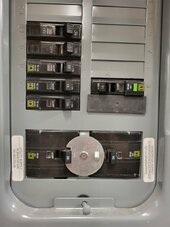First, you need STOP - come up with a PLAN BEFORE BUYING ANYTHING and once you have a plan STICK TO IT !
It takes a person 6 months (hard study) to get up to speed and fully understand, 1 year if "part time studying".
BIG RULE - Keep It Sweet & Simple !!! ALWAYS !
Stay to Native Battery Voltage. BODGING 12V battery packs together to make 24V or 48V simply put is DUMB ! Don't ! That is a Grand Invitation to Murphy's Laws to smack you down while costing you pile of cash. Engage Spouse as Sanity & Safety check.
Simply put, we recommend NOT to exceed 250A Draw from a Battery Bank.
12V@250A = 3000W = 120V/25A or 240V/12.5A
24V@250A = 6000W = 120V/50A or 240V/25A
48V@250A = 12,000W = 120V/100A or 240V/50A
* GROSS : Uncorrected for efficiency & losses.
IF you are looking for something in between your Generator Service Panel and your generator that will act as a House UPS (Uninterruptable power supply) that ca be done in a variety of ways. A FEW Questions that need answers,
- do you intend to use Solar Power as well or considering using it in the future ?
- do you plan on expanding later to take on more service capability ?
- do you want to use this for LOAD SHIFTING ? Meaning charge batteries at Low Time of Use Rate period (overnight usually) and using those circuits from the battery system during the day to offset High Daily use rates ?
! Think about the next 5 years... and consider the various rebates & incentives that exist now which may not later (If the Conservatives get power, they'll trash RE programs, Polievre {mini-Trump} already said as much).
There are several OPTIONS depending on the path you are considering.
ALL IN ONES (AIO's) come with Solar Charge Controllers, Inverter & Charger built into one modular using. Many can be installed in Parallel to increase capacity, they require large solar arrays, also may have dual AC input (1 from grid, 1 from genset) and there are various versions with different features, functions & capabilities. They can be cost effective BUT they also have caveats (no one likes to admit that) such as higher standby power usage.
Component systems with independent Solar Controller(s), Inverter/Charger(s) offer more flexibility & many gained efficiencies BUT there are most costs for balancing of system gear like fuses/breakers & wiring but it's not that bad. Daunting for the uninitiated but easy to get past with patience & understanding.
Both methods CAN be built with an eye toward the future & possible growth/expansion.
Product Longevity & Company chosen is IMPORTANT... Long-term service & support and knowing that parts, add-ons, etc will be supported for years in advance, means you should (better) to stick to Tier-1 Companies like Victron, Schneider, Midnite, Samlex etc... YES, this will cost a bit more but consider that Victron has been in business since 1975 ! They have great long-term support for the hardware and software and have built quite a lot around integration with their whole ecosystem.
Example:
Using a Samlex
EVO-4248SP 4200 Watt, 120/240 VAC Split Phase 48V Inverter/Charger. This has dual AC Input (Gen/grid) with ATS built-in, can deliver 4200W a@ 120V/240V. Has Direct Solar Input (external controller) and can be programmed into UPS mode or Load-Shifting etc.. (very programmable with priority use modes). This uses 48V Battery and does "not" require solar. These will be stackable meaning you can parallel them but they are just finishing the revised software & protocol stacks to do that.
Batteries:
You can buy prebuilt battery packs, or you can DIY your own (think of this site) which is not that hard to do BUT does require education/learning and an investment in tools that you most likely do not have. Here is a guide I wrote a while back,
Luyuan Tech Basic Lifepo4 Guide V1.0A download the PDF and review it, it will likely answer several questions and you'll see how an LFP Battery is put together.
We have Known Good Vendors & Suppliers and many reviews/teardowns & more on pre-assembled battery packs.
ASK Questions !!! There is no Stupid Questions except for the one NOT ASKED !
FACT: AC ELECTRICIANS (standard everyday joe's) have NO CLUE ABOUT DC SYSTEMS ! They ARE very different beasts and as such any external electrician must also know & understand DC power and related systems. Also you CANNOT look at this grade of DC in the same cavalier way as automotive DC systems.
Some of us are Hardcore and living offgrid & deploying these systems... I've helped populate the region here with solar & batteries (Algonquin Park Ontario region) and quite a few of us Canucks here too...
Final Note:
There is a HUGE amount of Misinformation out there peppered somewhat by Disinformation... Do NOT believe everything you read or see (Youtube) and engage in
Critical Thinking at all times. We even have some longterm members here who still "haven't got it" but still make suggestions etc (hey, it's other peoples money & risk, so some have fun)... HINT: Look at folks "About My Systems - similar" in their signature to at least see what they have, done & run...
Hope it helps, Good Luck



